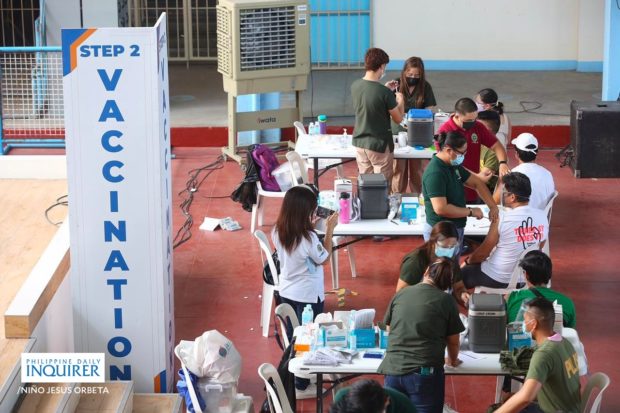WHO, DOST set crucial COVID-19 vaccine tests for Filipinos

Health workers and frontliners receive their 2nd dose of the Sinovac vaccine against COVID-19 held at Marikina Elementary School covered court, Marikina City on Tuesday, May 4, 2021. Niño Jesus Orbeta/Philippine Daily Inquirer
MANILA, Philippines — The World Health Organization (WHO) solidarity trial for COVID-19 vaccines is expected to begin next month to provide the Philippines with data on their safety and efficacy specific to Filipinos, according to Undersecretary Rowena Guevara of the Department of Science and Technology (DOST).
The government will provide funding for the “community-based clinical trial” and also conduct a P100-million “real world” study on the effectiveness of the vaccines, Guevara said.
“Real world data will answer questions on the effect of ethnicity because [the vaccines] will be given to Filipinos,” she said during a Laging Handa press briefing on Tuesday. “[T]he most important question we want to answer is, what is the [vaccines’] efficacy over time?” she added.
Guevara said the DOST would conduct a separate “mix and match” study that will determine the viability of giving two different brands of COVID-19 vaccines for the first and second shot. The same study will also look at the possible need for booster shots, and how soon they can be given after the first complete dose of the vaccine. (See related story on this page.)The WHO clinical trial will follow at least 1,000 vaccinated persons for a year and will release updates quarterly, Guevara said. A data and safety monitoring committee will be formed to keep tabs on the safety of the vaccines used in the trial, she added.
The study will be led by the University of the Philippines-Philippine General Hospital (UP-PGH), under the helm of infectious disease specialist Dr. Nina Barba, Guevara said.
Article continues after this advertisementAccording to the United States Food and Drug Administration (FDA), real world data taken from such studies is crucial in monitoring the postmarket safety and adverse events of drugs which, in turn, will inform regulatory decisions in the future.
Article continues after this advertisementThe WHO is working with local governments to recruit participants in the clinical trial.
Guevara said there was still a lot to be learned about the coronavirus disease, and that the clinical trials would show if there was a need to conduct annual follow-up vaccinations. The trials would also show if the vaccines needed to be tweaked or their dosing schedule changed to improve their efficacy, especially against the new COVID-19 variants.
The Philippines will be the first country to launch a study on mixing China’s Sinovac with other vaccines to address the local supply instability of other brands and the potential need for booster shots, the DOST said of its mix and match project.
The study will use the Sinovac vaccine as its baseline, but will involve other brands being used in the government’s mass immunization drive against the coronavirus disease, Guevarra said.
She added that Sinovac was chosen as the baseline vaccine because it uses the inactivated virus, which means it has the most classic or traditional technology platform for a vaccine.
The project called “A study evaluating the safety and immunogenicity of mixing different COVID-19 vaccines and vaccine platforms in Filipino adults” will be led by Dr. Michelle de Vera of the Philippine Society for Allergy, Asthma, and Immunology with a P133 million DOST budget.
According to Guevara, the selection process for participants in the study will begin shortly, since the study is targeted to start by June, subject to the approval of the local FDA. However, only those who have yet to receive their first dose can qualify for the study, since their baseline readings prior to vaccination will be taken into account.
3K participants, 8 sites
According to Science and Technology Secretary Fortunato de la Peña, the project will involve 3,000 trial participants from eight study sites in Metro Manila, Rizal, Cebu and Davao that have not yet received any COVID vaccine at the time of the study.
The study aims “to gather evidence [that a] mix and match… is safe and immunogenic,” said panel member and infectious diseases expert Dr. Rontgene Solante, in a separate interview. This means the experts would like to assess any adverse reaction from two different vaccines, while checking whether two different vaccines are immunogenic, or would produce better antibodies.
“Once we have the result, then we can recommend [the] specific mix or combination of vaccine brands,” Solante said.